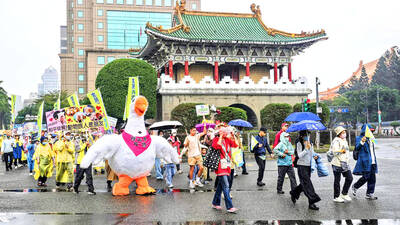The next president of the US should “do everything in his power” to ensure that political integration between Taiwan and China remains a “far-off prospect,” a new analysis says.
Written by American Enterprise Institute (AEI) researcher Shannon Mann, the analysis was published this week on the Web site PolicyMic, which is aimed at people in their 20s — the so-called millennials — interested in US foreign policy.
PolicyMic claims to have writers in 35 countries and more than 6 million unique monthly readers.
For many of those readers, Mann’s analysis may be their first significant introduction to the Taiwan-China issue.
Promises by the administration of US President Barack Obama to deepen economic and military ties with allies in the Asia-Pacific region have fallen flat in the light of budgetary realities, Mann says.
Defense cuts totaling nearly US$1 trillion over the next decade “expose the gap between the White House’s unrealistic expectations and the reality of limited resources,” and no other ally is left more vulnerable than Taiwan, Mann says.
In the past five years, Beijing has used its influence to dissuade other countries from signing trade agreements with Taiwan and Taipei has been led into deep economic ties with China, while Chinese leaders have openly stated that economic relations with Taiwan are part of an “embedded reunification” strategy, Mann says.
“Today, the American punditocracy believes that Taiwan’s reunification with China through intensifying economic reliance is inevitable,” Mann says. “If Taiwan integrates with China, however, US strategic interests in Asia will be greatly diminished both for the US and for our regional allies.”
Should China take over Taiwan it would win major advantages, including radar sites to search for US Navy ships in the Pacific and a deep-water naval base at Suao.
The Pratas Reef would extend China’s jurisdiction another 320km and control of Itu Aba Island (Taiping Island, 太平島) in the Spratly Islands (Nansha Islands, 南沙群島) would provide another military base in contested waters, Mann says.
Most importantly, the Taiwan Strait would become an inland waterway allowing Beijing to block Japanese and South Korean access to vital sea lanes.
“Even in the face of tremendous budget cuts, it is time to re-evaluate our policy towards mainland China and Taiwan,” Mann says. “Subsequent US administrations should help Taiwan become a member of the Trans-Pacific Partnership to decrease its economic reliance on China, as well as increase joint military training exercises.”
“The bottom line is that Taiwan can’t fall off the strategy-making table — tactics that encourage Taiwan to remain politically less ‘Chinese’ are necessary for US security in Asia,” Mann concludes.

NUMBERS IMBALANCE: More than 4 million Taiwanese have visited China this year, while only about half a million Chinese have visited here Beijing has yet to respond to Taiwan’s requests for negotiation over matters related to the recovery of cross-strait tourism, the Tourism Administration said yesterday. Taiwan’s tourism authority issued the statement after Chinese-language daily the China Times reported yesterday that the government’s policy of banning group tours to China does not stop Taiwanese from visiting the country. As of October, more than 4.2 million had traveled to China this year, exceeding last year. Beijing estimated the number of Taiwanese tourists in China could reach 4.5 million this year. By contrast, only 500,000 Chinese tourists are expected in Taiwan, the report said. The report

Temperatures are forecast to drop steadily as a continental cold air mass moves across Taiwan, with some areas also likely to see heavy rainfall, the Central Weather Administration (CWA) said. From today through early tomorrow, a cold air mass would keep temperatures low across central and northern Taiwan, and the eastern half of Taiwan proper, with isolated brief showers forecast along Keelung’s north coast, Taipei and New Taipei City’s mountainous areas and eastern Taiwan, it said. Lows of 11°C to 15°C are forecast in central and northern Taiwan, Yilan County, and the outlying Kinmen and Lienchiang (Matsu) counties, and 14°C to 17°C

STEERING FAILURE: The first boat of its class is experiencing teething issues as it readies for acceptance by the navy, according to a recent story about rudder failure The Hai Kun (海鯤), the nation’s first locally built submarine, allegedly suffered a total failure of stern hydraulic systems during the second round of sea acceptance trials on June 26, and sailors were forced to manually operate the X-rudder to turn the submarine and return to port, news Web site Mirror Daily reported yesterday. The report said that tugboats following the Hai Kun assisted the submarine in avoiding collisions with other ships due to the X-rudder malfunctioning. At the time of the report, the submarine had completed its trials and was scheduled to begin diving and surfacing tests in shallow areas. The X-rudder,

DEMAND: The government should enact regulations in line with Austria and Germany to incorporate vegan nutrition into school meals, an advocate said More than 1,000 people yesterday marched in Taipei to promote veganism, calling for legislation to incorporate vegan diets into school lunches and the national net zero emissions program. Participants gathered on Ketagalan Boulevard in front of the Presidential Office Building for the march, which was organized by the Vegan Action Network (VAN). Former ambassador to Chad Chiu Chung-jen (邱仲仁), actor Yankee Yang (楊子儀) and actress Cindy Lien (連俞涵) attended the event. VAN member Marianne Chao (趙梅君) said that the campaign aimed to urge the government to promote vegan diets across schools and government agencies via legislation and national policies, which would help build